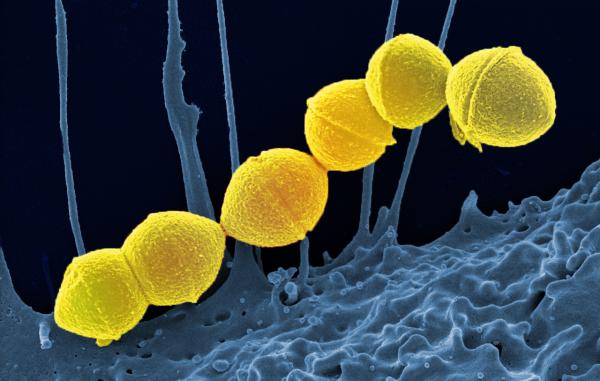Three people walk into a bar. They all pick up a strain of Streptococcus. Person A has no symptoms. Person B is laid up for a week in bed with Strep throat. And, person C ends up in the ICU. How?
When studying "host-pathogen" interactions, or how bacteria and humans interact, one big question is how much of the infection is caused by the characteristics of the "host" and how much is due to the "pathogen?"
Many times, researchers look to the differences between the hosts. So, if two people exhibit large differences in how an infection takes hold in their bodies - that the difference must lie between the two of you.
However, new research from the Fischetti Lab at The Rockefeller University sought the answer by looking at the other player - the bacteria that are doing the infecting. The work, published in PLOS Pathogens, found that the infection's course may be determined by the genetic background of the bacteria.
Instead of looking at infection using one strain, which is typically done in bacteriology, the group analyzed different strains of bacteria and looked at differences in the immune responses elicited by the strains. Dr. Uri Sela, the lead author, analyzed blood samples from healthy volunteers whose immune cells had been challenged with different strains of Staphylococcus aureus.
By comparing the T and B cell responses to 16 different strains, unique immune profiles were seen between strains.
To control for the host's part of the response, the group kept the person the same in this experiment. So, they compared the human adaptive T and B cell immune response to multiple strains of two major human pathogens, Staphylococcus aureus and Streptococcus pyogenes in the same individual.
Sela says “Our findings are novel and unexpected,” he notes, “and may set the stage for better ways to predict a patient’s disease outcome and tailor treatment accordingly.”
Why do different strains of the same bacterial species provoke difference immune responses?
The variations have to do with the "accessory genome" - that is genes that have been picked up by different strains along the way - mostly due to infection by phages (viruses that infect bacteria.) These genes encode a combination of virulence factors (proteins that cause disease) and superantigens (antigens that elicit a T cell response.)
In addition, they compared those bacterial strains that had the genes from phages still incorporated with those that had the genes from phages removed and found that the genes from the phages were contributing largely to the variation seen in the immune response.
Why people respond differently to infections of the same bacterial species has been a long standing question. These findings demonstrate that, perhaps, research should look more at the strain to strain differences between the bacteria instead of the person to person differences.
Source: Uri Sela. Strains of bacterial species induce a greatly varied acute adaptive immune response: The contribution of the accessory genome PLOS Pathogens January 11, 2018 https://doi.org/10.1371/journal.ppat.1006726




